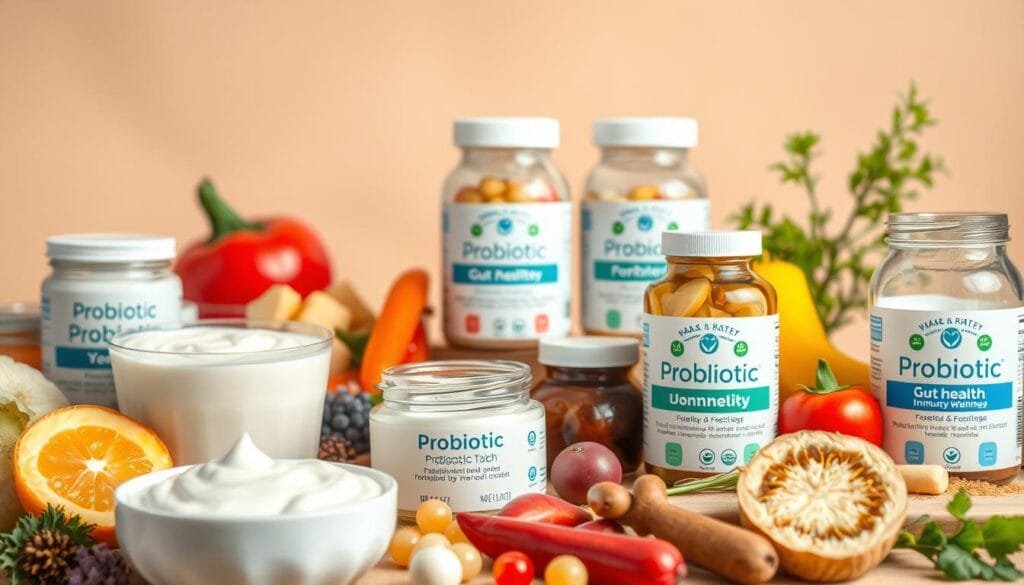Currently Empty: RM0.00
One in three people report frequent digestion troubles, and that number highlights how central the microbiome is to everyday health.
Probiotics are live microbes that help restore balance in the gut and support digestion, immunity, and mood. Well-studied strains from Lactobacillus and Bifidobacterium often appear on labels and in research for clear health benefits.
Food options like yogurt, kefir, kimchi, and sauerkraut can provide live and active cultures when labeled correctly. Evidence is strongest for preventing antibiotic-associated diarrhea and easing certain IBS and ulcerative colitis symptoms.
Wellness Concept in Malaysia offers friendly guidance on matching strains, CFU ranges (about 1–10 billion for general use), and trial periods of 4–12 weeks. Contact via WhatsApp +60123822655. Hours: Mon–Fri 9:30 am–6:30 pm, Sat 10 am–5 pm, Sun Closed.
Key Takeaways
- Probiotics are living microbes that support a balanced microbiome and better gut health.
- Strongest evidence supports use for antibiotic-related diarrhea and some IBS symptoms.
- Look for named Lactobacillus or Bifidobacterium strains on labels.
- Fermented foods with “live and active cultures” can be an approachable option.
- Trial a single strain for 4–12 weeks at about 1–10 billion CFUs to assess benefits.
- Wellness Concept in Malaysia provides local advice via WhatsApp +60123822655.
Why do you need probiotics: understanding the gut microbiome and balance
A balanced community of microbes keeps digestion steady and influences overall health. Probiotics are live microorganisms added to the digestive tract to bolster this natural ecology.
How they act inside the body
These microorganisms help friendly bacteria flourish by competing with harmful strains for space and nutrients. They also produce helpful compounds, such as short-chain fatty acids, that support the intestinal barrier.
Signs the microbiome is out of balance
Dysbiosis means an imbalance in gut communities. Common signs include irregular bowel habits, extra gas, and sensitivity after illness or antibiotic courses.
Key strains to know
Frequently studied genera include Lactobacillus and Bifidobacterium. Examples seen on labels are L. acidophilus and B. longum. Strain specificity matters because different strains yield different effects.
| Category | Mechanism | Typical Strains |
|---|---|---|
| Crowding out pathogens | Compete for nutrients and adhesion sites | L. rhamnosus, L. plantarum |
| Metabolite production | Produce short-chain fatty acids and antimicrobials | B. longum, B. breve |
| Barrier support | Strengthen gut lining and reduce permeability | L. casei, L. acidophilus |
Foods can provide live cultures, but product-to-product variability means verified strains and viable counts drive real benefits. Clear labeling and matching strain to the desired outcome helps set realistic expectations for future sections where the evidence for specific benefits is discussed.
Evidence-backed benefits: from gut health to immunity and beyond
Growing research shows certain microbial strains can ease bloating, support regularity, and curb antibiotic-related diarrhea. Clinical trials give the strongest evidence for preventing and treating diarrhea after antibiotics and for some irritable bowel syndrome and ulcerative colitis symptoms.

Digestive support
Live cultures can improve motility and help bowel regularity. That often means less bloating and more predictable routines. Colonization resistance also helps beneficial communities crowd out harmful microbes and lower risks of some GI infections.
Immune system modulation
About 80% of immune cells live near the gut. Selected strains strengthen the gut barrier and guide balanced immune responses. This supports daily immunity and can help keep inflammation in check.
Brain, skin and metabolic links
The gut‑brain axis connects microbes with the brain. Strains such as L. rhamnosus and B. longum have been studied for mood and mental health support.
Reviews also link better gut balance to calmer skin through reduced systemic inflammation. Some strains influence metabolic markers tied to weight and insulin sensitivity, though they are not a quick fix for weight loss.
| Area | Mechanism | Example Strains |
|---|---|---|
| Digestion | Improve motility, reduce bloating | L. plantarum, L. rhamnosus |
| Immunity | Barrier support, reduce inflammation | B. longum, L. casei |
| Brain & mood | Gut-brain signaling, stress pathways | L. helveticus, B. breve |
Summary: Evidence supports several health benefits, especially digestive and immune outcomes. Readers should match strains to goals and pair supplements with diet and lifestyle for best results. Practical how-to guidance follows in the next section.
Who may benefit most from taking probiotics
A short course of antibiotics or a bad stomach bug can leave the gut community thin and vulnerable. In these cases, targeted supplements often help rebuild beneficial microbes and ease common symptoms.
After antibiotics, infections or high stress
People finishing antibiotics, recovering from GI infections, or facing prolonged stress often see the most practical value. A focused supplement can help repopulate helpful strains and support everyday comfort.
Irritable bowel syndrome, ulcerative colitis and lactose issues
Certain strains show evidence for easing symptoms in irritable bowel syndrome and ulcerative colitis. Others supply beta-galactosidase activity that may reduce dairy-related gas and bloating.
- Some strains boost short-chain fatty acids to stimulate colon motility and relieve constipation.
- Try one strain at a time for at least four weeks, reassessing by twelve weeks for benefit.
- Those with weakened immunity or serious conditions should consult a doctor before starting.
| Group | Why they benefit | Typical outcome |
|---|---|---|
| Post-antibiotics | Repopulates helpful microbes | Fewer antibiotic-associated symptoms |
| IBS / bowel syndrome | Strain-specific symptom support | Reduced bloating, more regularity |
| Lactose intolerance | Enzyme activity from select strains | Less gas and discomfort |
Perspective: Those in good general health may focus on diet and lifestyle first. Matching the right strain to a person’s history is key to seeing real improvement.
Probiotic sources: foods versus dietary supplements
Everyday fermented foods offer a simple way to add live cultures to meals, while supplements supply consistent strain identity and CFU when targets are specific.

Food sources with live cultures
Yogurt, kefir, kimchi, sauerkraut, miso, kombucha and cottage cheese can provide helpful microorganisms when labels state “live and active cultures.”
Processing and storage affect viability. Checking for that label helps ensure the food contains live cultures.
When supplements make sense
Dietary supplements offer precise strains and reliable CFU counts for targeted goals. They come as capsules, powders, or liquids.
- Enteric-coated capsules help microbes survive stomach acid.
- Read labels for strain names, CFU at expiry, storage instructions, and a clear expiration date.
- Choose products with minimal fillers and that match personal diets.
Food-first adds variety and fibre pairing. For consistent, condition-focused support, try verified supplements and learn more from this guide at Wellness Concept.
How to choose and take probiotics for real results
A practical approach boosts chances of benefit: check strains, confirm CFU, and track results. Clear labels make selection easier and help match a product to a goal.
Reading labels: strain specificity, CFU range, and expiry
Look for named strains rather than brand claims. Strain specificity guides likely outcomes for the microbiome.
CFU targets: aim for about 1–10 billion daily for general use and confirm the count is guaranteed to expiry. Check storage and expiry dates before purchase.
Delivery matters: enteric coating, storage, and viability
Choose enteric-coated forms when survivability through stomach acid matters. Store supplements in a cool, dark place as directed.
Timing and duration: trial a single strain for 4-12 weeks
Take probiotics at the same time each day to build consistency. Trial one strain for at least four weeks and reassess by twelve weeks.
Possible side effects and who should consult a doctor first
Mild start-up effects such as temporary gas or stool changes can happen as the gut adjusts. Reduce the dose briefly if symptoms bother the user.
People with weakened immunity, serious illness, or complex therapies should consult a doctor before starting any supplement.
| Factor | What to check | Practical tip |
|---|---|---|
| Strain | Named strain with research | Match strain to goal |
| CFU | 1–10 billion typical | Check guaranteed at expiry |
| Delivery | Enteric coating, storage | Keep cool, follow label |
| Trial plan | 4–12 weeks | Keep a brief symptom log |
Wellness Concept Malaysia: friendly guidance for better gut health
Wellness Concept offers friendly, science-informed advice for Malaysians who want clearer guidance on gut health.
People can chat on WhatsApp at +60123822655 for personalised support. Advisors explain labels, compare delivery formats, and suggest simple routines that fit daily life.
Chat on WhatsApp at +60123822655 for personalized probiotic advice
Quick help: advisors can recommend food-based starters or targeted products when a reliable dose suits a goal. They also show how a supplement pairs with fibre, hydration, and sleep to support immunity and overall health.
Business hours in Malaysia: Mon–Fri 9:30 am–6:30 pm, Sat 10 am–5 pm, Sun Closed
- Monday–Friday: 9:30 am–6:30 pm
- Saturday: 10 am–5 pm
- Sunday: Closed
Ongoing support: clients are invited to check in after four weeks so advisors can fine-tune plans based on real-life results. The process stays practical, sustainable, and centred on the whole digestive system.
Conclusion
Simple steps—right strain, steady dose, and a short trial—make it easier to see real gut benefits. , Start with clear goals and a short symptom log to track progress.
In short: probiotic products deliver living microorganisms that help resident microbes restore balance in the gut microbiome and support everyday health. Evidence is strongest for easing antibiotic-related diarrhea and some IBS bowel symptoms, and probiotics may also support immunity, brain and skin pathways.
Choose strain-specific supplements, check CFU and expiry, store as directed, and trial one product for 4–12 weeks. For tailored advice in Malaysia, message Wellness Concept on WhatsApp at +60123822655 during business hours. Those with complex conditions should consult a doctor before starting.
FAQ
What are probiotics and how do they work inside the body?
Probiotics are live microorganisms, mainly strains of Lactobacillus and Bifidobacterium, that support the gut microbiome. They help by competing with harmful bacteria, producing short-chain fatty acids, and strengthening the intestinal barrier. These actions can improve digestion, reduce bloating, and support immune defenses.
What is dysbiosis and which signs suggest an imbalance in the microbiome?
Dysbiosis refers to an unhealthy shift in gut microbes. Common signs include persistent bloating, irregular bowel movements, increased infections, food sensitivities, and mood changes. When these symptoms appear after antibiotics or illness, a targeted probiotic approach may help restore balance.
Which probiotic strains are most important to know about?
Key strains include Lactobacillus acidophilus and L. rhamnosus for digestion, plus Bifidobacterium longum and B. breve for colon health and immune support. Specific strains target different issues, so look for labeled strain names on products rather than generic claims.
How strong is the evidence for digestive support like IBS and antibiotic-associated diarrhea?
Research shows specific strains can reduce symptoms of irritable bowel syndrome and lower risk of diarrhea after antibiotics. Effects vary by strain and dose, so clinical studies for the exact product matter when choosing a supplement for these conditions.
Can probiotics help the immune system and control inflammation?
Certain microbes modulate immune responses, support gut barrier integrity, and reduce low-grade inflammation. These benefits can translate to fewer respiratory infections and improved recovery from gastrointestinal insults when appropriate strains are used.
Is there a connection between gut microbes and mental health?
The gut-brain axis links intestinal microbes with mood, stress responses, and cognition. Trials indicate some strains may ease symptoms of anxiety or mild depression, likely by altering neurotransmitter signaling and lowering inflammation. Results depend on strain and individual factors.
How can gut health affect skin conditions?
The gut-skin axis means microbial balance can influence inflammation that shows on the skin. Improving gut microbes through diet or specific probiotics may help conditions like acne or eczema in some people, alongside dermatologic care.
Do probiotics influence weight and metabolic health?
Some strains show modest effects on weight regulation, fat distribution, and metabolic markers. Benefits are not universal and work best combined with diet and exercise. Choose strains supported by metabolic research for targeted goals.
Who benefits most from taking supplements after antibiotics or infections?
People recovering from antibiotics, GI infections, or extended stress often gain from probiotic support to rebuild lost microbes and reduce antibiotic‑associated diarrhea. Timing and strain selection are important to maximize recovery.
Are probiotics helpful for irritable bowel syndrome, ulcerative colitis, or lactose intolerance?
Evidence supports certain strains for IBS symptom relief and for maintaining remission in some ulcerative colitis patients. For lactose intolerance, fermented foods and some microbial strains can reduce symptoms by aiding lactose digestion. Consultation with a gastroenterologist helps match treatment to condition.
Which foods are rich in live cultures?
Natural sources include yogurt with live cultures, kefir, kimchi, sauerkraut, miso, and kombucha. These foods supply diverse microbes and can be part of a dietary strategy for gut health when consumed regularly.
When should someone choose a supplement over food sources?
Supplements offer consistent strains and defined CFU counts, useful when targeting a specific condition, recovering from antibiotics, or when dietary options are limited. Choose evidence-backed products with clear strain ID and stability data.
What should people look for on labels: strain specificity, CFU range, and expiry?
Labels should list full strain names (genus, species, strain ID), an effective CFU range at expiry, storage instructions, and clinical evidence or third‑party testing. Avoid products that only state “proprietary blend” without details.
How important is delivery method and storage for viability?
Delivery matters. Enteric‑coated capsules and refrigerated formulations can improve survival through the stomach. Check storage guidance—some require refrigeration while others remain stable at room temperature.
What is the recommended timing and duration for testing a single strain?
A trial of a single strain for 4–12 weeks helps assess benefits. If no improvement appears after a reasonable trial and dose, trying a different strain or consulting a clinician is appropriate.
What side effects might occur and who should consult a doctor first?
Mild bloating or gas may occur initially and usually resolves. People with severe immune compromise, recent major surgery, or central lines should consult a physician before starting live supplements to avoid rare infection risks.
How can Wellness Concept Malaysia assist with probiotic choices?
Wellness Concept Malaysia offers friendly guidance on strain selection, dosing, and product sourcing. Customers may chat on WhatsApp at +60123822655 for personalized advice during business hours.
What are the business hours for contacting Wellness Concept Malaysia?
Business hours are Mon–Fri 9:30 am–6:30 pm and Sat 10:00 am–5:00 pm (Malaysia time). The service is closed on Sunday.



